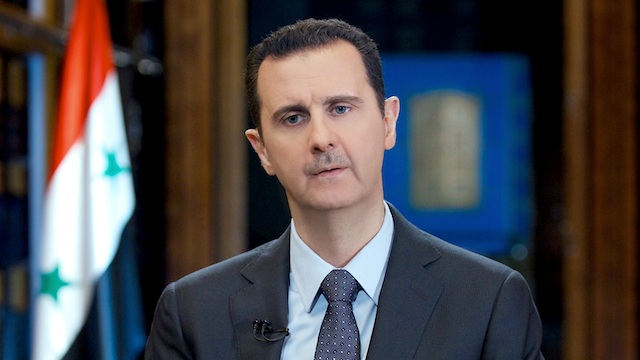SUMMARY
This is AI generated summarization, which may have errors. For context, always refer to the full article.

DAMASCUS, Syria – Syria will comply with a UN resolution to destroy its chemical arsenal, President Bashar al-Assad said on Sunday, September 29, as weapons experts prepared to head to Damascus to begin the task.
In the latest violence, an air raid hit a high school in the northern rebel-held city of Raqa killing 16 people, including 10 students, as troops battled rebels on several fronts, a watchdog said.
A team of around 20 inspectors from the Organization for the Prohibition of Chemical Weapons is due in Damascus on Tuesday, October 1, and will immediately meet regime officials, an OPCW official said.
“At this point, we have absolutely no reason to doubt the information provided by the Syrian regime,” the official told journalists at its headquarters in The Hague on Sunday.
On Monday, September 30, another group of UN inspectors is due to wrap up a probe into several alleged chemical attacks.
They hope to draft by late October a comprehensive report, which will also cover the August 21 attack in Damascus suburbs said to have killed hundreds of civilians with the nerve agent sarin.
The regime and the rebels have traded accusations of chemical weapons use during the 30-month war that has killed more than 110,000 people and forced two million to flee.
The United States threatened military action after the August 21 attack, in which it said regime forces had deliberately killed hundreds of civilians with rocket-delivered nerve agents.
Syria denied the allegations but agreed to relinquish its chemical arsenal to head off a strike under a US-Russian deal which was enshrined in a landmark UN Security Council resolution.
In his first comments since the resolution was passed on Friday, Assad told Italy’s Rai News 24 television his regime “will comply” with the resolution.
“Of course we will comply with it, and history proves that we have always honored all treaties we have signed,” he said, according to the state news agency SANA.
Assad also said warming relations between the United States and Syria’s ally Iran could be beneficial for Damascus and the region, “so long as the United States is honest”.
But he said that most European countries “are unable” to play a role in the much-delayed peace conference on Syria which is now being planned for mid-November in Geneva.
UN chief Ban Ki-moon pressed for the conference during his first meeting Saturday with Syria’s opposition National Coalition chief Ahmad Jarba, who said he was ready to send a delegation to the conference, a UN spokesman said.
Syrian Foreign Minister Walid Muallem, meanwhile, insisted there could be no talk of Assad’s departure – a demand of both Western governments and the Syrian opposition.
“There can be no discussion of the future of President Assad. It is in the constitution,” he said at UN headquarters.
Shock, tears and mangled bodies
Video footage posted online by the Syrian Observatory for Human Rights showed carnage at the high school bombed in Raqa, including mangled bodies, one lying under schoolbooks.
Its authenticity could not immediately be verified.
“There was panic, with children crying as they sought to take shelter,” the Observatory quoted a survivor as saying.
Raqa, the only provincial capital in rebel hands, was captured from government forces in March and is now largely controlled by Al-Qaeda loyalists of the Islamic State of Iraq and the Levant.
It lies in the Euphrates valley 160 kilometers (100 miles) east of the Aleppo, Syria’s second city.
The air strike came after rebels overnight attacked army positions in Nasseriya al-Qalamun north of Damascus, killing at least 19 soldiers and wounding 60, the Observatory said.
Rebels also seized a swathe of land linking the southern Daraa province to the Israeli-occupied Golan Heights after four days of fierce fighting which left 26 regime soldiers and several rebels dead, the watchdog added.
Jordan has protested to Syria that a shell from the fighting fell on its northern town of Ramtha.
The operation to destroy Syria’s chemical arsenal, which Ban has called “daunting”, will be one of the biggest and most dangerous of its kind.
Syria’s arsenal is believed to include more than 1,000 tons of sarin, mustard gas and other banned chemicals stored at an estimated 45 sites across the country.
The United Nations and the global chemical weapons watchdog have launched an urgent appeal for experts to join the mission to destroy the weapons by a target date of mid-2014.
OPCW experts are to visit all production and storage sites that Syria has identified. Damascus is to provide further details by Friday, October 4. – Rappler.com
READ MORE: The Crisis in Syria
Add a comment
How does this make you feel?
There are no comments yet. Add your comment to start the conversation.